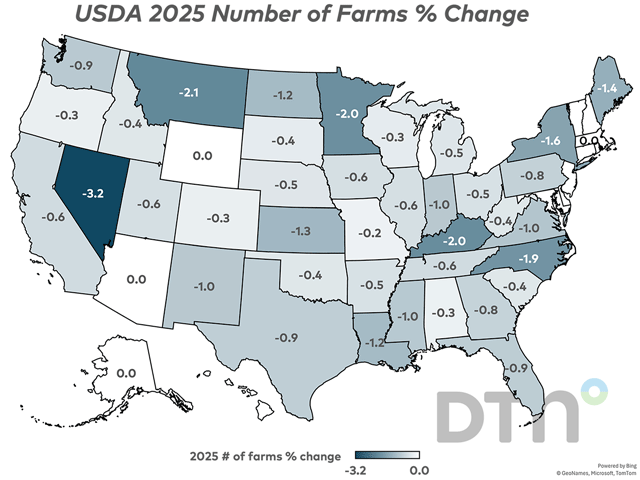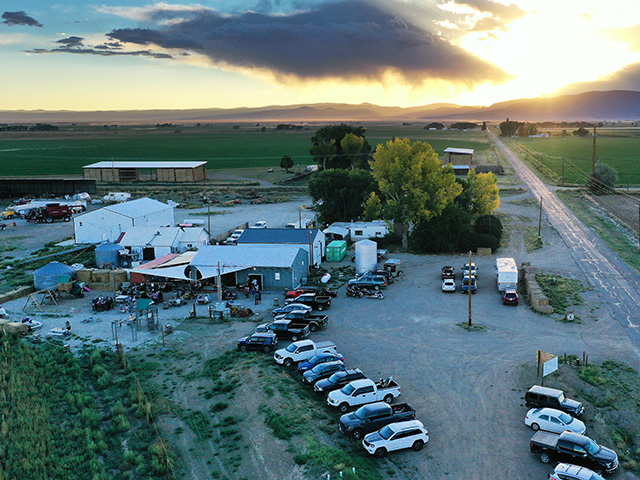Family Farm Taps Beer Success
Farm-to-Tap, Uber-Local Craft Beer Approach Helps Save Colorado Family Farm
ALAMOSA, Colo. (DTN) -- When selling the farm looked like the only responsible option remaining, salvation came where plenty may look, but few ever find it.
For the Cody farm in southern Colorado, help came in a bottle of beer.
It was 16 years ago and the Cody family had already tried pinching pennies. They'd already shuttered the dairy and given up a heartbreaking amount of land, slicing their fourth-generation operation in the San Luis Valley from 2,000 acres owned and leased to just 300, the last chunk centered on Pappy Ray Cody's original Great Depression-era homestead.
For much of its time, the farm had been focused on growing high-quality malting barley for Coors Brewing Company and Anheuser Busch. It was an arrangement that funded the family for decades, but by 2005, it simply was no longer sustainable.
After 80 years, the time had nearly come to sell what remained of the Cody farm.
"Our family farm was being threatened like everyone else's," said Jason Cody, one of three brothers from the fourth generation of Codys who are involved in the family business. "We didn't know how long we could hold on, so we started trying to find a different way. We had to."
The diminishing value of those beer contracts proved to be part of the problem. But beer itself -- that proved to be the answer.
They took their barley and learned the process of making malt themselves, then took their business from alcohol's largest companies to some of the smallest, embracing local ingredients and a farm-to-glass approach at every step.
It was a gamble and it saved the farm.
A BIG BET
The Cody family has been making its living in the high-altitude San Luis Valley for nearly 100 years, since Pappy Ray put his stakes down outside Alamosa, Colorado, during a New Deal farm resettlement program in the 1930s. He had taken the federal government up on an offer of 40 acres, where he mostly planted forage crops; a house, where he planted a pine tree on either side of the front door; and a chicken shed.
His son, Bob Cody, got the family into beer, signing contracts with the country's big breweries and growing the operation to one of the largest in the region. Things began to sour into the 1990s, however, and by the time Bob died in 2004, the farm seemed to be near its end. Wayne Cody, the third generation, was still working, but his sons had all left the area to attend college and pursue careers.
It was time to sell, but Bob's wife, Phyllis, insisted everyone wait one more year and consider all options.
Selling still seemed to be the most sensible option, but Wayne and two of his sons, Jason and Josh, couldn't shake the feeling there may be more there in the barley, though not with another season growing for the big international corporations. Instead, they dreamed up an independent operation that proved well ahead of its time: a craft malt business that could supply unique and small-batch malt barley to microbreweries and craft distilleries.
Buoyed by the ideas, Jason charged into the old milking barn, little more than a storage shed for a decade at that point. He began dragging dust-crusted old equipment and trash into the farmyard. Soon, they'd repurposed the barn and much of the dairy equipment to malt barley.
P[L1] D[0x0] M[300x250] OOP[F] ADUNIT[] T[]
Today, they have two separate businesses on the farm. Colorado Malting Company grew from those risky 2005 decisions. Colorado Farm Brewery came about in 2018.
Both are thriving and now have pulled in even more family and friends. Wayne's brother, Tim Cody, the "gatekeeper of the malt," handles logistics and organization, and Jason and Josh's brother, Bobby, works remotely and helps online. A neighboring farm family, Keith and Suzanne Tolsma, invested in the brewery, as well, and help daily.
"The only way we could survive was to change," said Josh Cody, who oversees the brewing. "The question is: How can you change and add value to your product in a way that makes you stand out? For us, it was craft beer."
POURING IT ON
The Codys became trailblazers for a movement that's gaining traction in the beer industry, one that tucks perfectly in with larger trends, including fresh local ingredients and farm-to-table restaurants. Farm breweries are popping up around the country.
Most farmers don't brew beer and most brewers don't farm, so it's not easy.
"It's a growing trend for sure, but it's really hard to do," said Diana Cheyenne Harvey, a professor at the College of the Holy Cross in Massachusetts who has studied the craft beer industry.
"They're really rare," he said of the Cody family. "It seems to be an easier direction to go from a farm to a brewery rather than a brewery to a farm."
The crown jewel for on-farm breweries is an estate beer, a brew created entirely from ingredients from that particular farm. Even some of the larger brewers are trying to play along. Sierra Nevada, based in Chico, California, grows 10 acres of hops and 100 of barley on site and has released an Estate Farmhouse Ale.
But the Codys still manage to keep a leg up on "local" thanks to their on-farm malting facility. They're the only ones to produce beer that literally never leaves the property -- growing, malting, brewing and even bottling on the farm.
Their craft malting business was the first of its kind when it began shipping malted barley in 2008, first just 10,000 pounds of malt. The family was unsure enough of its direction it sent out postcards to breweries around the country asking if there would be interest in their small-batch malted barley.
The response was a resounding "yes" and business exploded. By 2014, the company had a waitlist of 238 breweries eager to buy. It now produces more than 1.5 million pounds of malt annually, some for breweries but much of it for craft distilleries.
Along the way, they've aggressively sought to keep things new and interesting, chasing taste and, at times, characteristics like gluten-free options while malting and selling everything from sunflower seeds to quinoa.
"The big commercial malters lean toward efficiency, but our program is based on flavor," said Jason, who heads up the malting side of the farm. "I have some stuff going on that will blow the top off flavor in malt. It's going to change the world."
AT HOME WITH A BEER
The roots are deeper on the malting side of the business, but it's on the brewery side on an autumn evening where it's easiest to get an idea of what's happening.
The Sangre de Cristo mountains tower to the east, harboring some of the tallest peaks in the contiguous United States, and the San Juan mountains stand to the west, hiding world-famous ski resorts. The San Luis Valley is wedged in the middle, a blot of green irrigation circles amidst a region of grey and white.
A chill set in when the sun ducks behind the mountains, but the parking lot at Colorado Farm Brewery filled, a band played and a local food truck was hopping.
The scene isn't drastically different from that at many of Colorado's 400 craft breweries, except, on this night, a combine roars. The parking lot is so close to the barley field visitors would be wise to leave their car windows rolled up, or they come back to a car blown full of dust and chaff.
"These guys were pretty much broke 20 years ago," said Gene Zelnicek, the custom harvester who's been cutting the Codys' barley for decades.
Zelnicek used to spend so much time in Colorado harvesting malting barley two of his children were born there even though he actually lives in Oklahoma. It's an entirely different world now as the big brewer contracts can't support small farms the way they did 70 years ago.
The Codys, where booze still pays the bills, are the exception.
It all comes together in the brewery's estate beers, usually two or three offerings of the eight or 10 beers available in the taphouse. Those are the ones entirely sourced from the 300 acres the family still farms -- the hops, the barley, the water and even the yeast -- a strain entirely unique to the Codys' operation.
It's not just the beer that ties directly to the land and its history. It's everything.
There's the repurposed dairy barn that now helps malt the grain.
The machinery shop that served the farm for all those decades was stripped to the studs and remodeled. Today, it's the brewery taproom and giant family photos of generations gone by looking out from above the bar at the farm they worked, somehow both the same and entirely transformed.
When customers sit to enjoy a beer created entirely from the crops being harvested outside, even where they sit is part of the story. The tabletops were cut from one of the front-door pine trees Pappy Ray Cody planted when he arrived to start a new life nearly 100 years ago.
"We're a return to what the agricultural world once was, a renaissance" Josh said. "International commodity trading wasn't a thing in the ancient world, or even into the very recent past. It's the industrial model that's really the new model. What we've started here is a rebirth of what once was, local ingredients brewed into the local beer and consumed by local drinkers. That's really the business model."
Joel Reichenberger can be reached at Joel.Reichenberger@dtn.com
Follow him on Twitter @JReichPF
(c) Copyright 2021 DTN, LLC. All rights reserved.




